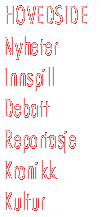
|
Ansvarlig redaktør: Informasjonsdirektør Anne Katharine Dahl Redaktør:
Teknisk ansvarlig:
|
|
Stewart's
Corner
«Getting Your English
Right»
Spørsmål angående
engelsk kan stilles til språkrådgiver Stewart Clark,
Studieavdelingen, e-post: stewart.clark@adm.ntnu.no,
As many people who have read this column
since 1996 have requested, it is now in book form. «Getting
Your English Right» is a 242-page book. About a third of
it is adapted from this column, the rest is new. It is concentrated
on typical word confusions for Norwegians (and others) in English,
which we all know is a «Getting Your English Right» is not a book of jokes. It introduces a lighter tone by using some amusing examples of Norwenglish and other confusions. This is a new approach to language guides which are typically heavy to digest. The whole point of the book is to help guide people through the maze of potential problems in English and humour is only used to reinforce the message. Fischel focused on this approach in a paper in English Teaching Forum entitled: «Why murder your pupils when they can laugh themselves to death?» Tricky words number, no. Number (Norw. nummer) means an arithmetic
value: «This is a round number». No. (Norw. nr.) is an In AE, the hash sign # is often used instead
of no. number with «a»,
Number with «a» (Norw.
antall) means several or some, and when it is Number with «the» (Norw.
antall) means the size of the total, and when there is a following
plural noun, it always takes a One way to remember whether to use a plural or singular verb is the codeword PAST. This stands for Plural with A number, Singular with The number. Enlightening Norwenglish Las Vegas Travelog (http://www.lasvegastravelog.com/forign/norweigan/index.html) Even a virtual trip to Las Vegas is worth it. With a web address where there are misspellings in both «foreign» and «Norwegian», you can guess what to expect. Some extracts: « At Las Vegas Travelog, vi want til fortalte deg av all de fantastisk plasserer at eksistere i denne areal, langs med all aktivitetene og nearby plasserer at you'll want til plass på din visitasjon agenda. Og isn't den forbløffe We're ikke bare stolt av Las Vegas proper, men vi føle at denne city og all omringe arealene are noe av de flest opphisse plasserer at en could noensinne bringe en familie. - Helikopter Tours Grand Canyon 3 timene av opphisselse.»
|
